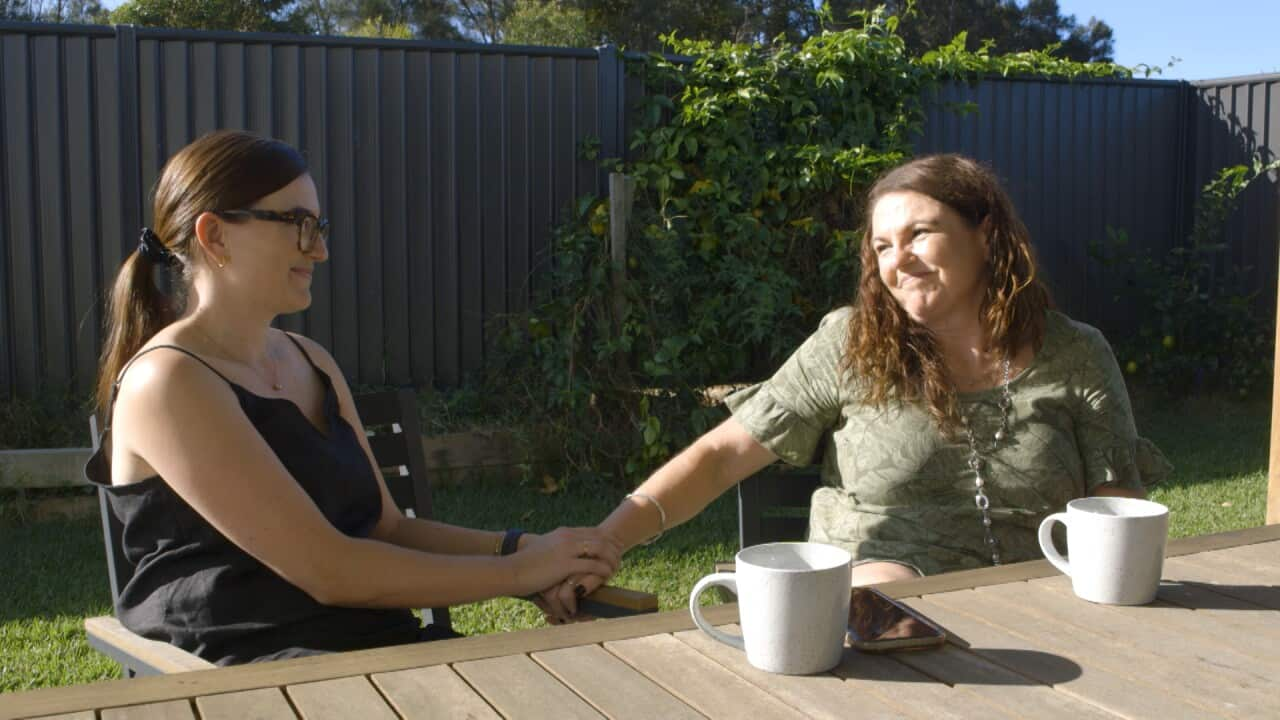This week’s Insight explores the ethics, impacts and outcomes of transplants. Watch 'Transplant Breakthroughs' on .
In February, Kirsty Bryant, 30, became the first woman in Australia to receive a uterus transplant.
Six weeks after her surgery, which was part of a clinical trial at the Royal Hospital for Women in Sydney, she is recovering well and has had her first period.
However, her mother Michelle Hayton, who donated her uterus, has been unwell.
“I had a few bumps in the road,” she told Insight. “I’ve had a couple of infections but definitely getting stronger every day.”
The procedure is still considered experimental. If the trial proves successful, it will make it possible for Australians born without a uterus, or whose uterus has been removed or damaged, to carry a child. Around one in 5,000 people in the country have the rare Mayer-Rokitansky-Kuster-Hauser (MRKH) syndrome, which typically means their uterus may be small or absent.
But uterine transplantation is not a life-saving procedure, which presents its own ethical issues.
Dr Rebecca Deans is the gynaecologist who led the trial.
“It's quite a complicated procedure. And we've only done, in the world, less than 80,” Dr Deans told Insight.
Unlike in a standard hysterectomy, the surgical removal of the uterus for transplantation requires taking out blood vessels and other tissue without affecting other important organs in a live donor. The operation can take between eight to 12 hours.
Dr Deans said the trial has received the necessary ethics approval under Australia’s Human Research Ethics Committee’s framework to perform the procedure on six patients.
“At the moment we’ve got ethics approval to do six. And we’re going to do a combination of transplant surgeries from living and deceased donors."
Dr Deans said that for the Australian trial they have set a limit of five years, or two live births, for a person to have a transplanted uterus. The reason is the immunosuppressing medications that can affect other organs in the long run.
Ms Bryant had her uterus removed after suffering a haemorrhage during the birth of her first child in 2021. She said she always wanted to have more children. After her hysterectomy, she looked at alternative options such as surrogacy and adoption.
It's quite a complicated procedure. And we've only done, in the world, less than 80.Dr Rebecca Deans
“People wanted to reassure me that you still have your ovaries, you still have your eggs, you'll be able to have biological children. But obviously, I wasn't going to be able to carry another pregnancy,” she said.
“Carrying a baby doesn't make me any more of a parent or a mother. But I knew that I wanted to be pregnant again and that I wanted to carry another baby.”
What are the ethics around elective transplants?
Macquarie University bioethicist, Associate Professor Mianna Lotz, has advised the Royal Hospital for Women on ethical issues the trial has raised.
One of them is whether the risks are justified for transplantation that is not life-saving.
“When we shift to something like a life-enhancing or quality of life transplant, as they're also known, the question immediately arises for people, is there a medical need for this?” Associate Professor Lotz said.
Because donors are living people, it’s important to make sure their decision is voluntary and informed about the complexity of the procedure as well as medical and psychological risks.

Michelle underwent transplant surgery to donate her womb to her daughter.
“But they also need to be really informed and really thinking carefully over a period of time about the potential psycho-emotional risks.”
Associate Professor Lotz added that besides questions about safety and consent, there are wider ethical concerns over the social stigma around infertility, which might give rise to the pressure on women and their partners to experience pregnancy.
However, as Associate Professor Lotz noted, even a decision that something is a medical need doesn’t settle the question of whether it should or should not be treated.
We're talking about a donor who's healthy, who doesn't have any medically indicated need for a 10 or 12-hour surgery.Associate Professor Lotz
“Some preferences and desires are so central to people's conception of a good life and to what they perceive their identity to be, that to simply say, ‘well, that's a mere reproductive preference that you have’, is to treat it without due respect and not accord it due significance,” she said.
“We all need to make a careful deliberation and determination of what it is we're going to treat as a need, or as a preference and what is worth and important to divert our medical resources towards addressing.”
Ms Hayton, 54, said the surgery was worth it.
“Even knowing everything that I know now, would I still have done it? Yes, definitely,” she said.
“As a mother, you do anything for your children. I really knew how much Kirsty wanted to carry another baby.”
Kirsty said that while there is a chance that she may not fall pregnant again, she is proud of her involvement in the trial.
“I knew I wanted to put my hand up and my hat in the ring and; hopefully, what we've done so far and the surgery will help other women and help the doctors and the team,” she said.
“Hopefully women out there realise that this may be an option for them one day.”
Watch “Transplant Breakthroughs” from Tuesday, 8.30pm on SBS On Demand.
If you would like to learn more about organ donations go to donatelife.gov.au












